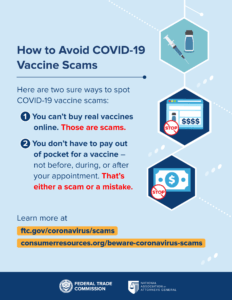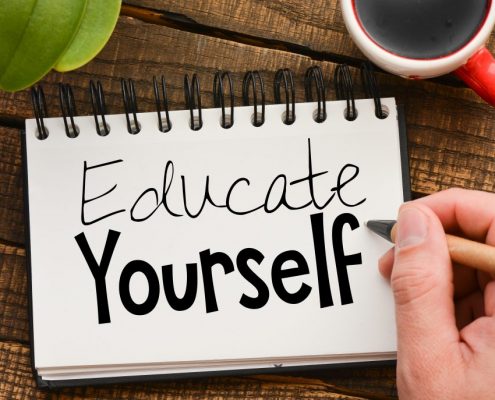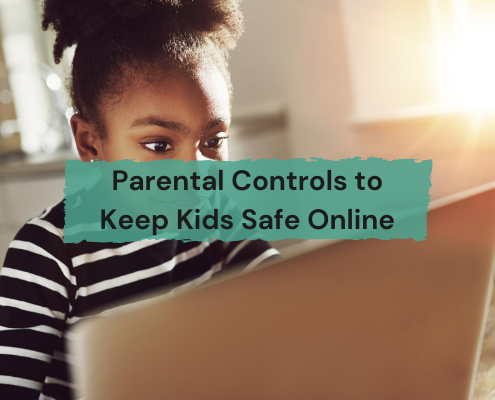COVID-19 Vaccine Scam Alert
COVID-19 vaccines are here. Scammers are too.
The distribution of COVID-19 vaccines is ramping up every day at an amazing speed. As of April 19, every person in the U.S. 16 years of age and older is eligible to receive one.
 Vaccines are being distributed to federal- and state-approved locations. States have their own specific vaccination plans. You may want to check with your state for specific information regarding distribution plans in your state. More information on where and how to get a COVID-19 vaccine is available on state/local health department, pharmacy chain, and healthcare provider websites. You may also want to check the CDC’s Vaccine Finder website here and talk with your local health care provider or pharmacist.
Vaccines are being distributed to federal- and state-approved locations. States have their own specific vaccination plans. You may want to check with your state for specific information regarding distribution plans in your state. More information on where and how to get a COVID-19 vaccine is available on state/local health department, pharmacy chain, and healthcare provider websites. You may also want to check the CDC’s Vaccine Finder website here and talk with your local health care provider or pharmacist.
In the first few months of the vaccine rollout scammers have already been scheming. Here’s what you can be sure of:
- You will not need to pay anything out-of-pocket before, during, or after getting the vaccine during this public health emergency whether you’re insured or uninsured. If you’re insured, the vaccination site might bill your insurance company for an administration fee. If you’re not insured, there’s a fund set up with the Health Resources and Services Administration (HRSA – part of U.S. Department of Health and Human Services) where sites can recover their administrative costs. Either way, though, they’re not supposed to bill you or charge a co-pay.
- You can’t pay to put your name on a list to get the vaccine. Anyone who asks for a payment to put you on a list, make an appointment for you, or reserve a spot in line is a scammer.
- No one from a vaccine distribution site or health care payer, like a private insurance company, will call you asking for your credit card or bank account information to sign you up to get the vaccine.
- Beware of providers offering other products, treatments, or medicines to prevent the virus. Check with your health care provider before paying for or receiving any COVID-19-related treatment.
- Don’t post your vaccination card to your social media account. Your vaccination card has information on it including your full name, date of birth, where you got your vaccine, and the dates you got it. When you post it to Facebook, Instagram, or to some other social media platform, you may be handing valuable information over to someone who could use it for identity theft.
Don’t pay for a promise of vaccine access or share personal information. Instead, report it to the FTC at ReportFraud.ftc.gov or file a complaint with your state or territorial attorney general through ConsumerResources.org, the consumer-facing website of the National Association of Attorneys General.








